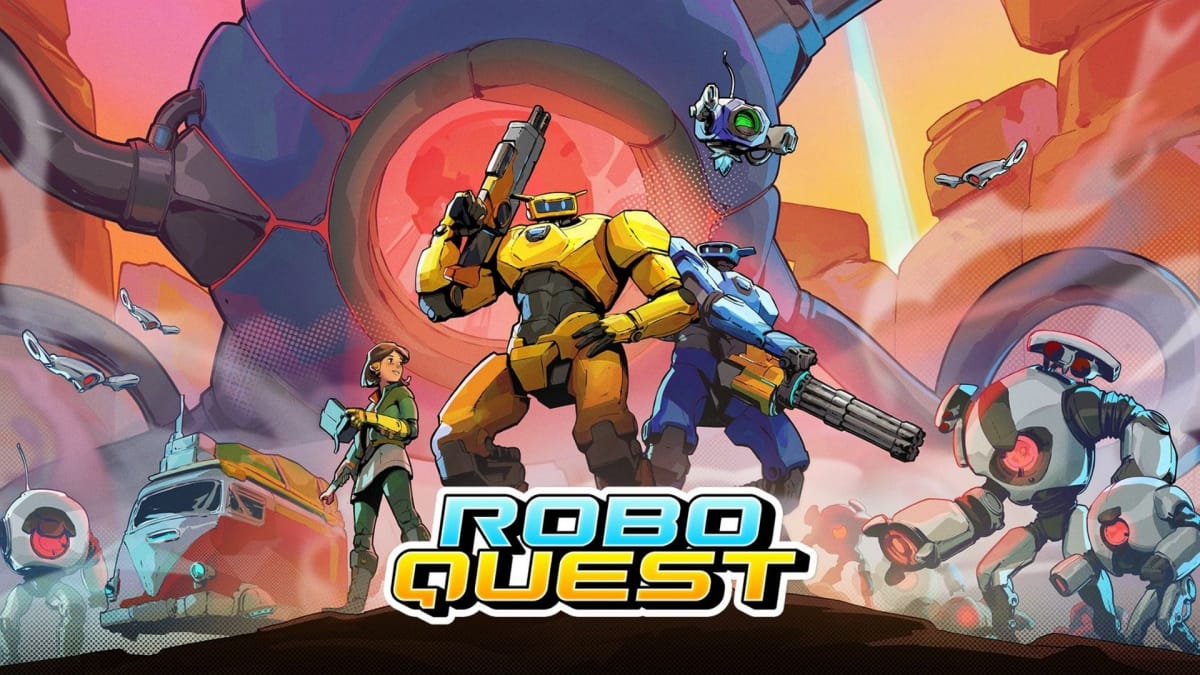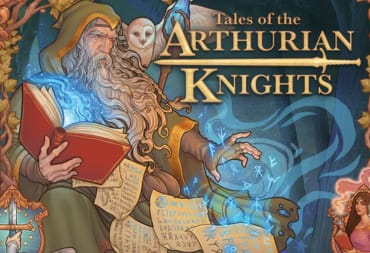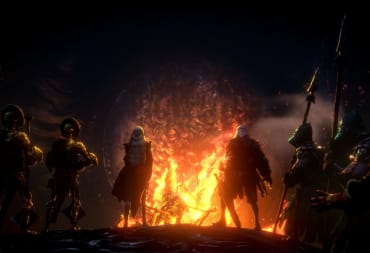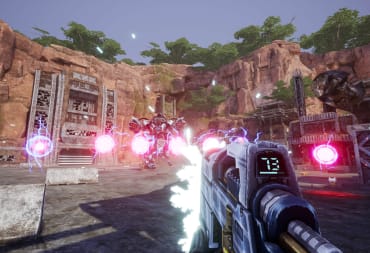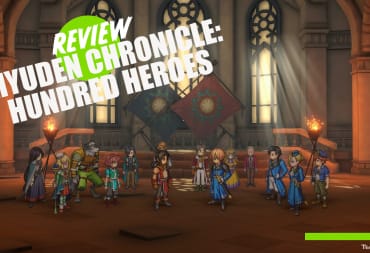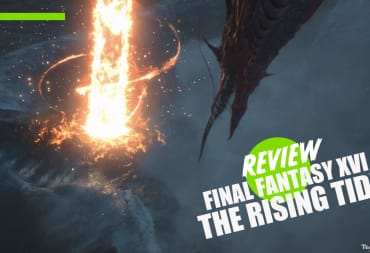When it comes to the FPS branch of roguelikes and roguelites, you won’t find a universally praised title in the same way you would for say, a dungeon-crawling roguelike, or a deckbuilding roguelite. Many have certainly tried, from the City of Brass to the Tower of Guns, but is Roboquest the upgrade this particular sub-genre needed? Read our review to find out more.
This is the third release from Ryseup Studios, a French team previously focusing on VR titles like Winter Break and The Burning Descent before releasing Roboquest in early access in 2020. You play as a guardian robot revived by a young tech-savvy kid called Max, who lives in a world full of deathly hostile robots. Together with her other mechanical creations, you gear up to fight fire with fire, bringing down the head honcho responsible.
Before we get into the metal heart of Roboquest, one thing that should be immediately pointed out is the style, or rather emulation, of two certain properties: Borderlands and XIII. From Borderlands, you have the gameplay core of big guns, and wildly varying numbers of damage and stat increases. With XIII, the graphic novel visual direction has been recreated with aplomb, including the onomatopoeic words peppering the HUD from gunfire.
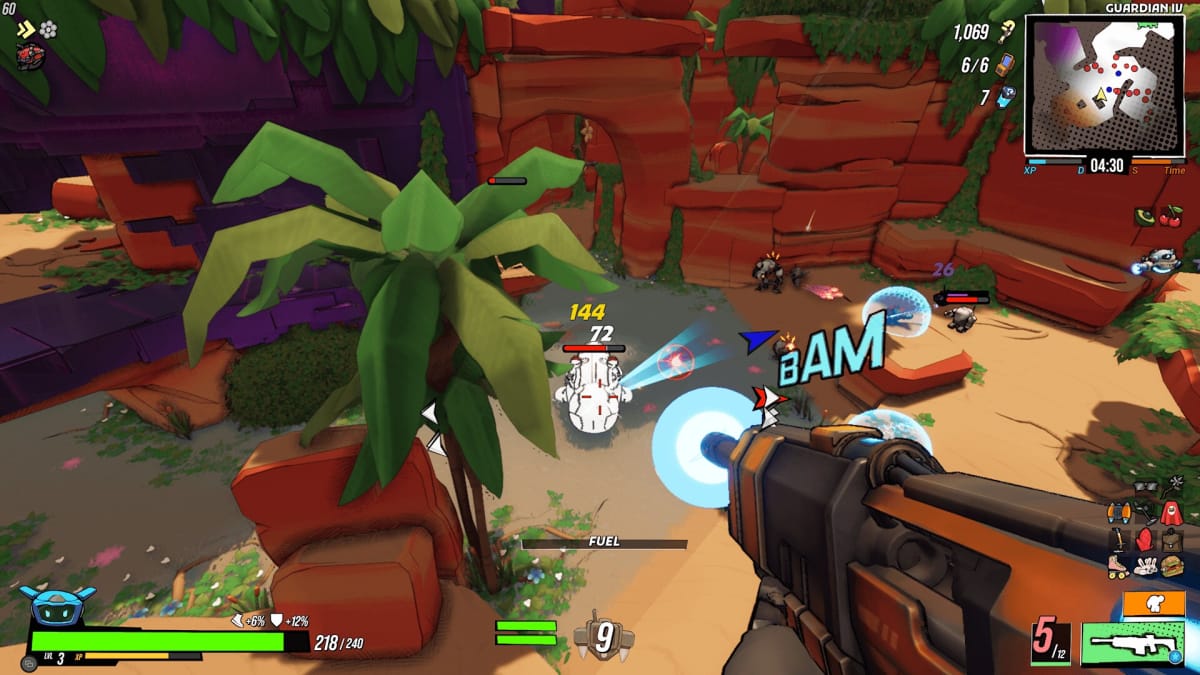
The result is a game that crowbars the best elements from the two titles mentioned and mixes it into a gameplay structure that should feel like biting a style. However, Roboquest is much more than that, with Ryseup still maintaining an identity of their own throughout.
Gameplay consists of your standard FPS gameplay, pushed to the brink in breakneck pacing, with the roguelite elements being appropriately light. There’s a growth system for each run that’s prevalent, but that progression doesn’t resonate when it comes to your usual temporary items. Upgrades that aren’t tied to the leveling system fail to have the same impact unless they’re exceedingly rare, but that might have something to do with the difficulty options.
This is where Roboquest strays from the path, with difficulties having to abide by rules, and from there, its rigorous structure may be why it doesn’t feel like an ultimately pleasant roguelite. Even as you increase the difficulty, and more aggressive enemies seen in the later levels show up as early as the first stage, there’s a repetition that exists which nullifies the randomization elements.
It’s hard to admire what creativity Roboquest’s builds can have when it sticks to this procedure, especially when it comes to the level layouts.
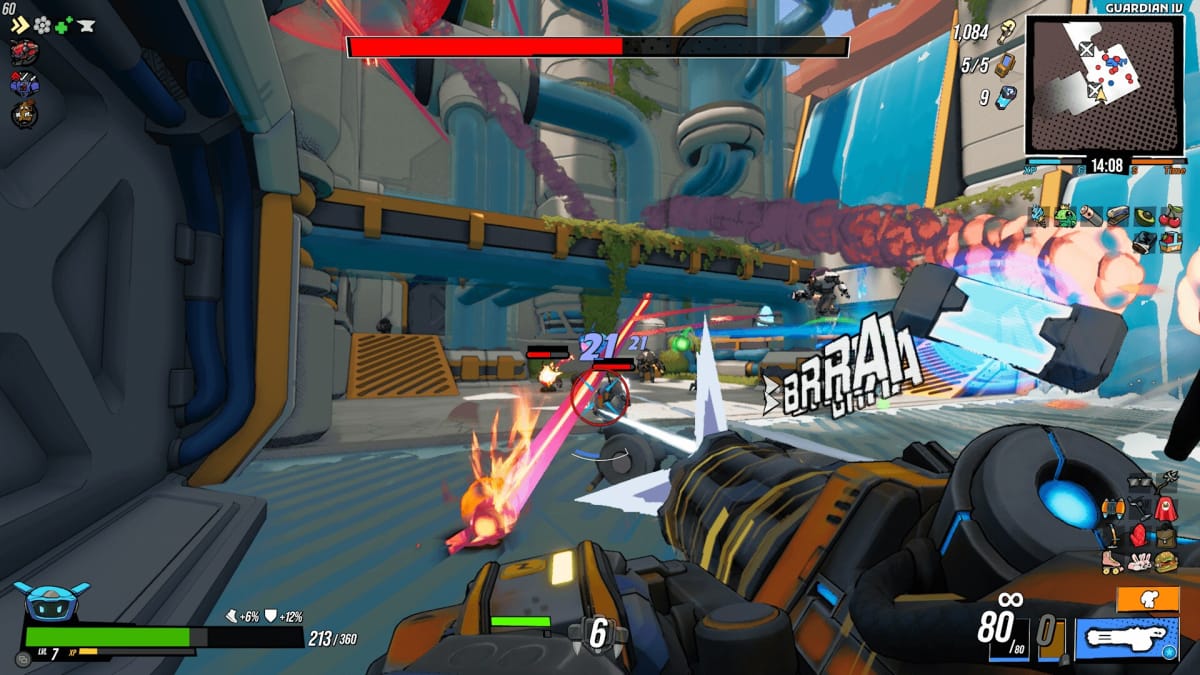
In “Oasis” there will always be a holdout half-way through, where you’re locked inside a room and are forced to eliminate all enemies. In “Fields”, there will always be a flying mini-boss before the first rest stop. In “Aqua Station”, the holdout location will always have a platform above everyone in the middle, before capping it off with a mini-boss waiting by the level exit.
There are secret levels, hidden quite well in the structure Roboquest is housed in, and these amount to nifty challenges that rely on speed, precision, and efficiency. However, these only work towards attaining “Power Crystals”, the 6 of which will permanently nullify the difficulty of the final boss. While they can be turned on and off for your preference of challenge, there struggles to be a lack of desire to return to them, especially considering their singular gimmickry.
What’s strange however is that a lot of this can be considered negligible to the actual quality of Roboquest, as its actual FPS gameplay is phenomenal. Regardless of build, variety, design, or randomization aspects, this game is a frenetic, beautifully-paced tour de force of some of the tightest and most realized combat you’ve ever seen.
While Borderlands can stagnate in its demand to rush along, Roboquest thrives, employing a rhythmic procedure that a game like this thoroughly needs.
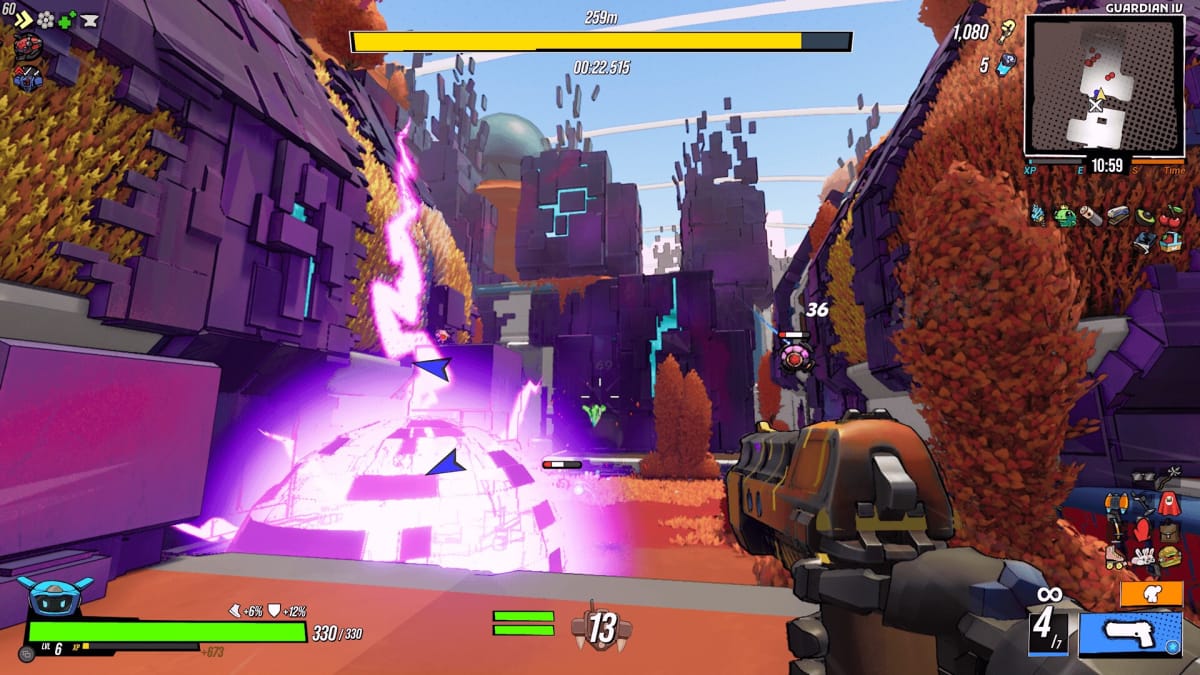
This is thanks to some fantastic sound design propped up by the aforementioned onomatopoeic words on display, and a brilliant soundtrack from EDM artist Noisecream. It’s a gargantuan effort, consisting of a hearty mix of EDM, electronic rock, chiptune, and bitpunk, but there’s a perfectly fitting aggression that accompanies the minor edginess that Roboquest has. It’s also dynamic, with the switches in gameplay quite obvious, but it compliments the player in such a way that demands agency without belittlement.
While the more obvious roguelite elements fail to make a dent in varying a playthrough, the weapon variety makes up for it in spades. From auto rifles to steampunk shotguns, elemental cannons to tomahawks, it’s clear Ryseup went hard in trying to diversify their portfolio of armaments, and they’ve succeeded. Every factor of feedback coalesces into an experience that never gets old, no matter what you’ve equipped.
It’s rare that you’ll find a weapon that’s completely useless for what you’re trying to achieve, which most of the time, is victory.
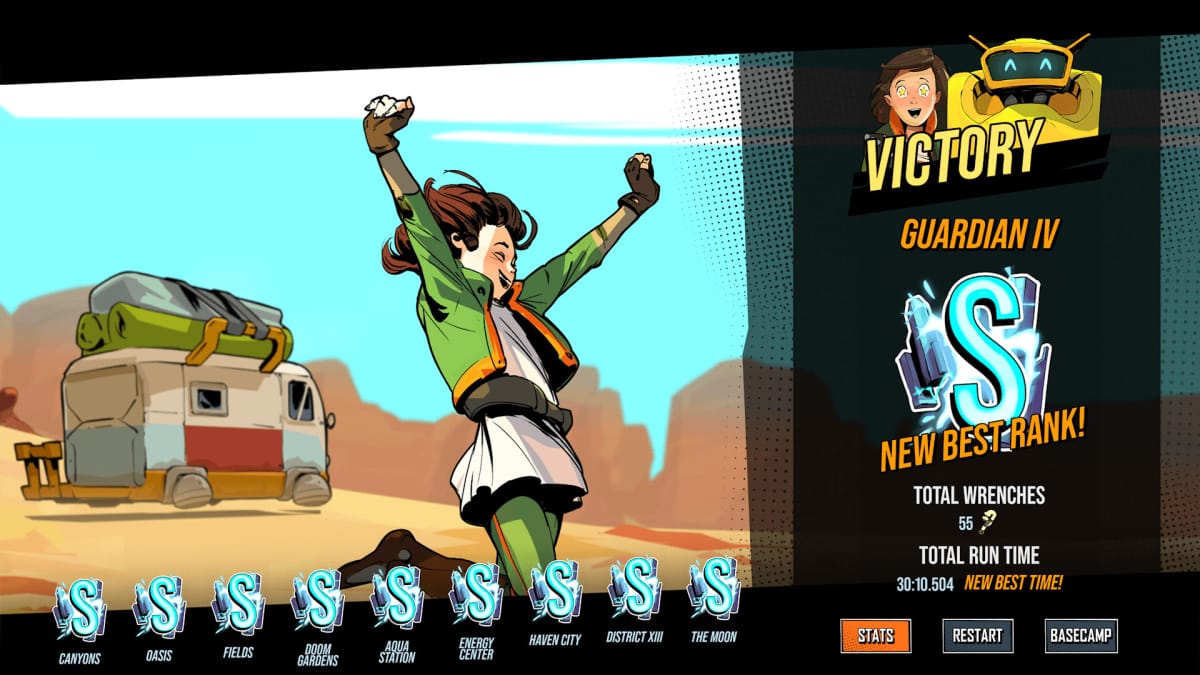
With that said, victory is too easy to come across a lot of the time. Even with eight different difficulty options, and a mechanic to tune down the difficulty of the final level, you could put your money where your mouth is and still accidentally win. This may be due to a lot of blindspots that the final level has, including a rather funny issue with the final boss being countered by standing right underneath them.
On that note, cooperative mode can fix this issue, although it might not be for the better. When a second player is involved, the health of each enemy is increased significantly, to the point where it starts to feel like the Borderlands you know and tolerate in its lowest points. It can still be a blast under the right circumstances, but when you're under heavy metal, you’ll find yourself playing a cover shooter more than a bad-ass robo-Wick experience.
It’s clear that Roboquest has some oversights that can undermine the actual brilliance it possesses in moment-to-moment gameplay. There’s a fire trying to burn here, one that’s so enlightening to see, especially in the wake of its inspirations suffering some harsh downfalls. Borderlands has turned into your least favorite Scary Movie entry, and XIII is now tied to the worst remake in years.
Roboquest Review | Final Thoughts
There are traditions passed down that Roboquest sees sight of, and what it wants to attain is a sole feeling: the rush of your first time. I spent 50 hours on Roboquest, and even after mastering it, I’ll spend 50 more, just because it always feels like the first time. That cacophony of metal explosions, the explosive force of its armory, fine-tuned to a point of complete universal fun.
In its attempt to build an accessible FPS roguelite, Roboquest has stumbled across a macrocosm of sheer genius. At a certain point, it stops being a roguelite with no attempt to diversify, but an FPS that captures both a nostalgic identity, and a boundary-pushing pace-breaking lesson for the future. Roboquest may be a one-trick pony, but that trick turned out to be the sickest Superman flip you’ve ever seen.
Roboquest was reviewed on an Xbox Series S with a copy bought by the reviewer over the course of 50 hours of gameplay - all screenshots were taken during the process of review.
Review Summary
Pros
- FPS gameplay is fantastic
- Noisecream soundtrack is appropriately heavy and dazzling
- Weapon variety is admirable and well-tuned
- Visual design provides nostalgia without patronization
Cons
- Roguelite elements are obfuscated and ignored
- Strict structural design can add to potential repetition
Have a tip, or want to point out something we missed? Leave a Comment or e-mail us at tips@techraptor.net
